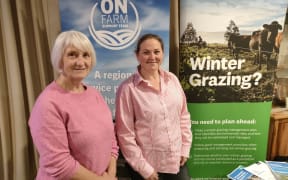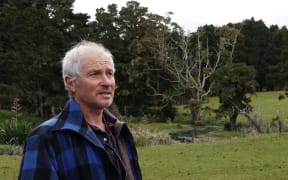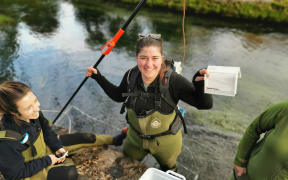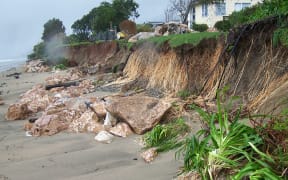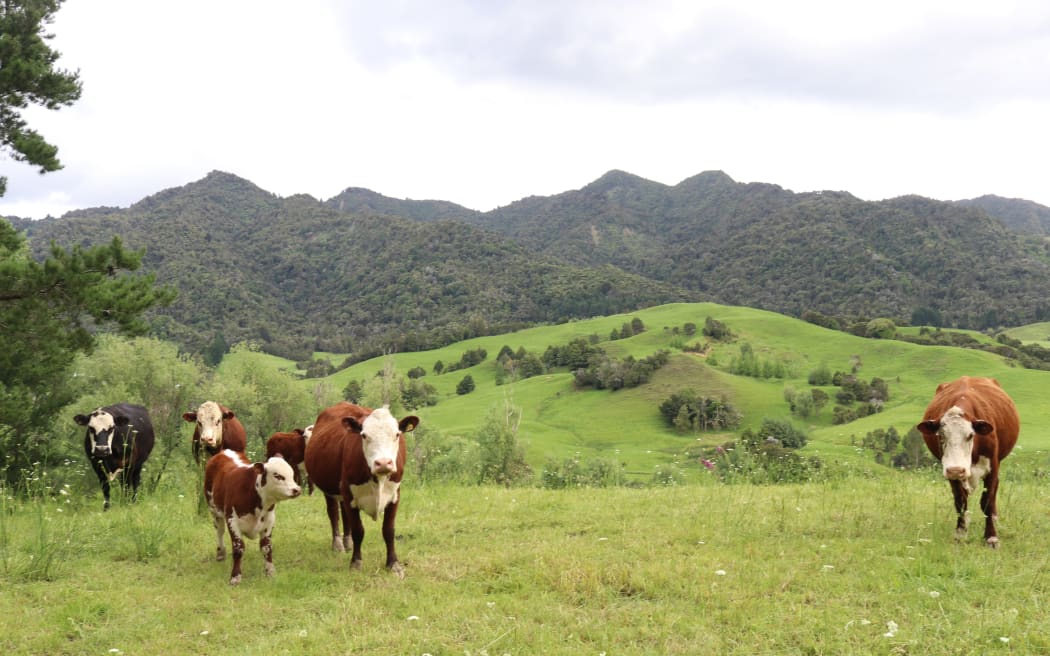
The Northland Regional Council proposals could see stock banned from steep, highly erodible land, including parts of South Hokianga (pictured). Photo: Peter de Graaf
Far-reaching proposals for protecting Northland's rivers and lakes could see stock banned from the region's most erosion-prone farmland and up to 10 metres from all waterways.
The Northland Regional Council says change is needed to meet government regulations and to reverse the decline of waterways in a region where almost 95 percent of rivers are contaminated by the faecal bacteria E.coli.
But a farming group says a grazing ban on steep hill country would cost Northland hundreds of millions of dollars a year - and could force some farmers off the land.
Consultation on the council's draft Freshwater Plan Change opened on 1 November and will run until March.
Although the plan contains a raft of measures designed to protect Northland waterways, the most controversial are likely to be around setbacks from streams, stock exclusion from erodible land, and water allocations for tangata whenua.
Feedback sought by the council includes whether the setback from waterways should be three, five or 10 metres.
Those areas would have to be fenced to keep out stock and would ideally be planted.
While there are existing rules around keeping stock out of waterways, they do not apply to all animals or all streams.
The document states the bigger the setback, the better the results - but it also concedes that means higher costs for farmers.
"We are concerned about the financial cost for landowners, many of whom are already facing tough times. This can be mitigated somewhat by allowing sufficient lead-in time, but even so the cost will be significant," the document's authors state.
If the plan is accepted in its current form, stock could also be excluded from highly erodible land.
The plan defines land with a slope of 25-35 degrees as having a high erosion risk, while land with a slope of 35 degrees or more is deemed to be at severe risk of erosion.
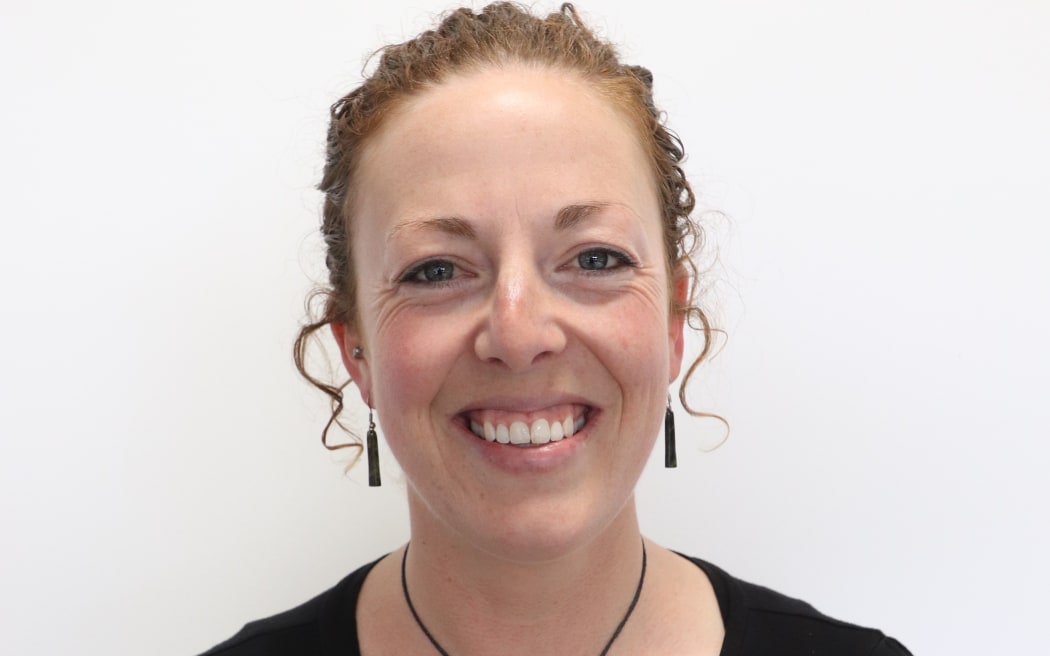
Northland Regional councillor Amy Macdonald expects a 'fulsome conversation' about the freshwater plan. Photo: Supplied / Northland Regional Council
Regional councillor Amy Macdonald said she anticipated pushback, especially on the erodible land proposals.
"We're expecting a fulsome conversation. We are very aware that this is big," she said.
"It's a big environmental challenge and it's been a long time in the making … Wherever we land with the new rules, there will be significant change.
"But we also know that it's super important to our community. So we're hoping to have a lot of feedback that helps us make good decisions," she said.
Macdonald said sedimentation was Northland's biggest freshwater pollution issue.
Much of the plan was aimed at stopping sediment getting into streams and rivers, then ending up in harbours and estuaries.
"Those environments are so important to us here. This is our opportunity to start the change that we need to get improved water quality," she said.
Excluding stock from erodible land had not been attempted before in Northland, she said.
"Stock exclusion from some lowland areas has been a part of our landscape for a long time now and is well accepted. But we know our hills are a really significant source of sediment into our catchments. So the big step we need to take in this conversation is how we deal with that steep erodible country."
The council accepted the changes could mean significant costs for landowners.
"And that's the balance we're trying to find. There's an environmental cost to a lot of current practices, and we need to weigh that up against the cost that will be borne by individual landowners as they make the changes," she said.
"There's also ways we can support landowners to make these changes. We'd like to get feedback around timeframes and the kind of support that people need to make the change, because my understanding is everybody wants to see this change. The question is how we do it and how fast we do it."
Macdonald said the final version of the plan would have to deliver the government's bottom line on water quality, but also be sustainable for people who lived and worked on the land.

Incoming MP Grant McCallum says there is too much regulation for farmers in Northland. Photo: RNZ / Peter de Graaf
Incoming Northland MP Grant McCallum said the council's plan was fallout from the Labour Government's national policy statement for freshwater management.
"It's a classic example of the over-reach and over-regulation we talked about in the campaign, and the sort of things we're going to look at, because the balance has been shifted to a point where there's too much regulation for the farmers in Northland. It'll make it harder for them to do their jobs."
If the plan went ahead in its current form, farmers would find it "very challenging" to make a living in some areas, McCallum said.
A spokesman for Federated Farmers said the erodible-land proposals could affect 250,000ha of Northland, according to the council's figures.
That amounted to just under 20 percent of Northland's total area and about 40 percent of its pastureland.
Losing that much pasture would slash Northland's farming income by about $270 million a year, and that was without taking stream setbacks into account.
In hill country areas, such as Whangaroa and North Hokianga, farming could become uneconomic.
Communities could shrink as farmers walked off the land, leading to school closures and further loss of services.
The spokesman said reduced stock numbers would also mean one Northland freezing works would have to close.
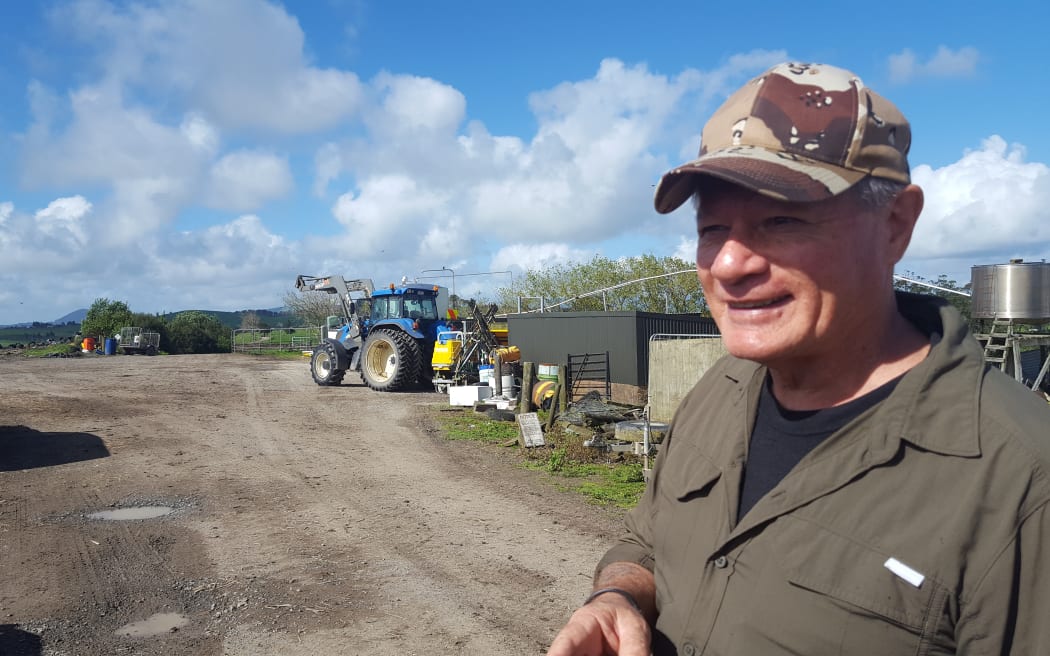
Millan Ruka monitors waterways around Northland by boat and kayak. Photo: RNZ / Lois Williams
Clean water campaigner Millan Ruka, however, said change was needed.
During the past 50 years the majority of Northland rivers had become unswimmable, he said.
Ruka set up Environment River Patrol Aotearoa in 2010 after being shocked by the state of the Wairua River, west of Whangārei, and now monitored waterways around the district by boat and kayak.
He said expanding forestry had led to "great amounts" of sediment washing into Kaipara Harbour, and dairy effluent discharge to land was barely regulated.
As a result, animal waste ended up in waterways any time it rained.
Ruka said flaws in the draft freshwater plan change included a lack of provision for monitoring or allowing Māori to exercise their kaitiakitanga.
He also questioned the proposal to allocate 20 percent of water to tangata whenua, given that many rivers were already over-allocated and water use consents were often locked up for 35 years at a time.
The Northland Regional Council is also proposing new rules for dairy effluent discharges, a ban on new wastewater treatment plant discharges to water, and restrictions on exotic forestry in dune lake catchments.
A separate draft action plan sets out steps the council itself could take to improve freshwater quality.
They include reduced rates for rural landowners and funding to support stock exclusion, riparian planting and wetland restoration.
Similar proposals are being considered by other regional councils around New Zealand.
